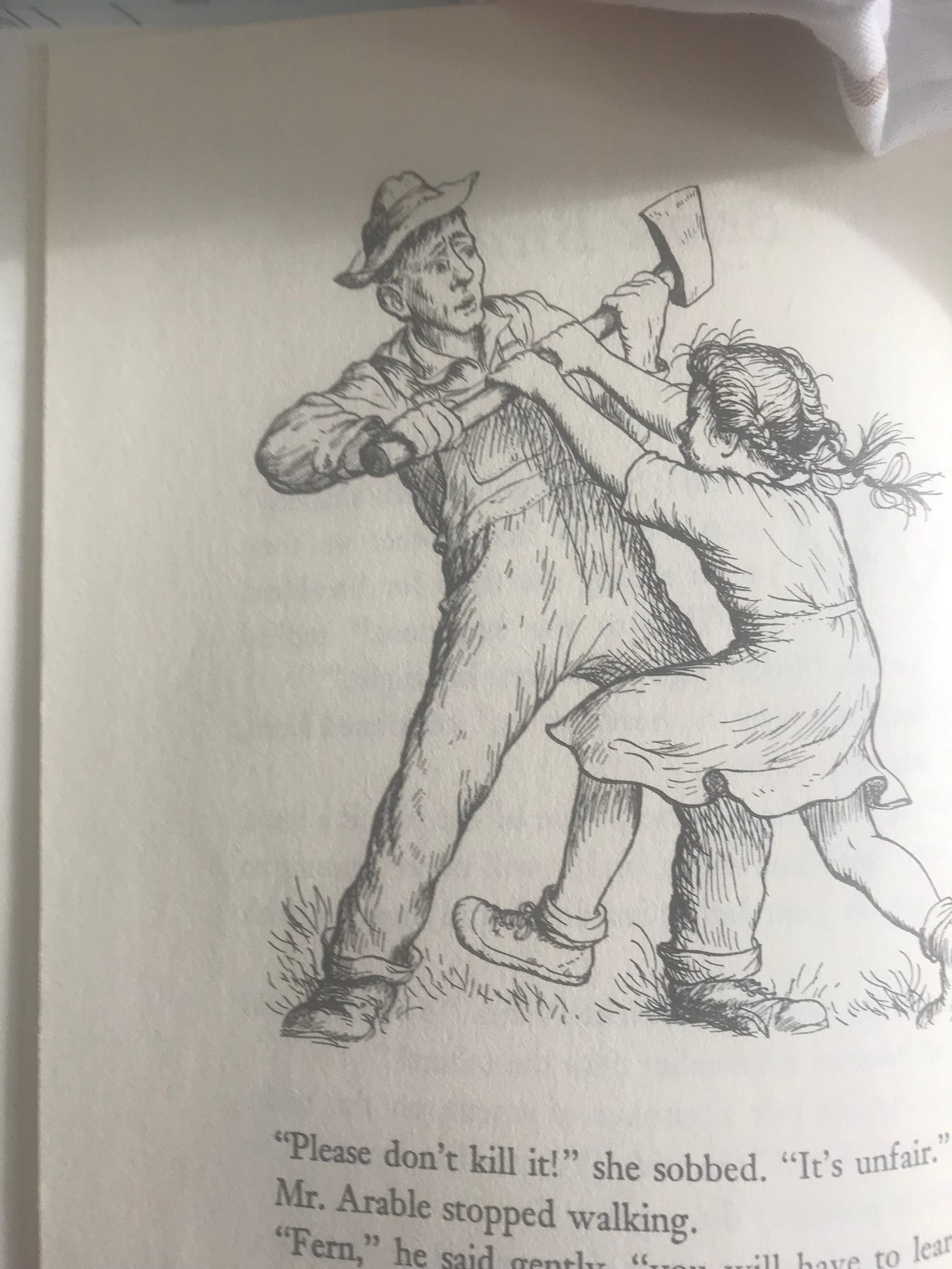It’s not in the Lower School library of my old school except as an audiobook—this book I loved to read in second grade. It’s not in the Middle or Upper School library. When I searched for it there, I found The Essential Feminist Reader and similar titles.
The First Amendment Museum comments, “Charlotte’s Web proves that anything can offend someone, somewhere.”
In 2003, the headteacher at a school in Batley, West Yorkshire, England, banned all books featuring pigs, including Charlotte’s Web, Winnie the Poo and The Three Little Pigs, fearing they might offend Muslim students and families. None of whom filed a single complaint. Muslim community leaders formally requested an end to the ban.
I’m saving the silliest example (but there are so many!) for last. In March, 2021, Arielle Silver-Willner wrote a piece for Lilith Magazine trashing Charlotte’s Web as a relic of the past—and she hates it. She claims, “all the good lessons happen in a world that is so relentlessly gendered in such a dated way.” She gets this idea from the opening scene, in which Fern asks, “Where’s Papa going with that ax?”
Who could not read on at this point? We want to know where John Arable is going, and what he’s planning to do, and what the ax has to do with his plans. Kate DiCamillo remarks in her introduction to the 2012 Introduction to the book that she only read it because her writing teacher said it was “a miracle of storytelling.”
Fern’s mother explains that a litter of pigs was born the previous night, that one is a runt, that her dad’s going to “do away with it.”
But Arielle Silver-Willner just doesn’t get it. Fern tries to yank the ax from her father’s hands and as he cries, “control yourself” she does the reverse, demanding to know, “if I had been very small at birth, would you have killed me?” Of course not, says her dad, smiling down at her but insisting that a little girl is one thing, a runty little pig is another.” Fern insists she sees no difference, adding, “This is the most terrible case of injustice I have ever seen.”
In other words, she’s anything but compliant. She’s not backing off and saying, “Oh, sorry, daddy, you know best.” But here’s Silver-Wilner’s take on the scene:
Isn’t that [control yourself!] one of those phrases men used to patronizingly say to “hysterical” women? The feminist childcare worker in me winces. Because the “hysterical” woman stereotype has deep roots in the infantilization of women and the notion that we are emotionally “unhinged”—which is not only an insult to a woman’s expression of real, reasonable feelings, but also to the feelings of a child. Mr. Arable feels that his daughter has lost control because she is showing pain at the idea of her father killing a baby animal.
Yeah, yeah, yeah. He’s hoping she’ll go away and let him to go back to business, but instead, “a queer look came over John Arable’s face,” and he’s actually about to cry. He relents and says he’ll bring back the runt to Fern, and everything else he says indicates his daughter has taught him something: “and may the good Lord forgive me for this foolishness.” It’s Fern who has insisted her father control himself—quite a feat for an eight-year-old girl.
Silver-Wilner, however, can’t wait to dig her claws into this touching scene:
as a queer woman today, it stings to be reminded that a word I (proudly) use to describe my identity originally held such a negative connotation—and now does not feel like the right time to have this conversation with two children who have never known the word to mean anything other than rainbows and television makeovers (yes, they watch Queer Eye). So, this is strike two.
She’s going for three strikes and the book’s out. Plus, we’re only on page 3.
Fern’s enjoyment of adorable baby Wilbur the pig disturbs her:
This sourpuss doesn’t like girly-girls. Who knows what she means by “a symbol?” Clearly nothing good. An obedient, subservient girl who never thinks of contradicting mom and dad—clearly what Fern is not.
I could go on. Enjoy this treasure and read it aloud to anyone from birth to third grade—they ought to be reading to themselves by then.
I’ll leave you with some links I found while researching this post.
https://firstamendmentmuseum.org/banned/
https://manybooks.net/articles/six-books-that-were-banned-for-silly-reasons
https://readingpartners.org/blog/five-more-childrens-books-you-didnt-know-were-banned/
https://www.npr.org/2011/07/05/137452030/how-e-b-white-spun-charlottes-web
https://brill.com/view/journals/mnya/25/1/article-p1_019.xml






These comments are hilarious . . . until we realize wonderful books are banned because of them.
"Queer" was an adjective long before it was a noun.